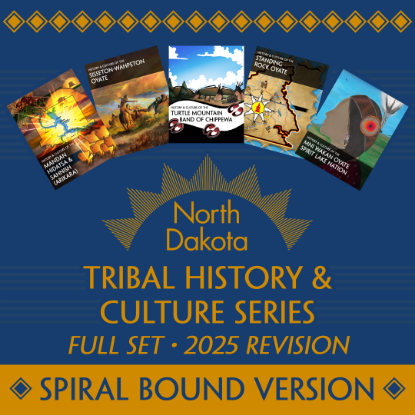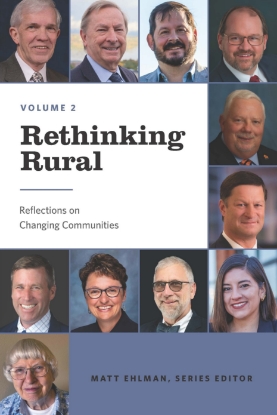New Titles
Tribal History & Culture Series Spiral-bound Set
AVAILABLE NOW FOR PRESALE TO TAX EXEMPT CUSTOMERS ONLY.
Our copyeditors, designers, and marketing teams are working with this project during our summer 2025 season with an anticipated late fall 2025 to early spring 2026 delivery date. We are happy to take presale orders in the meantime, and we will fill your order as soon as copies are available. At this time, the textbooks are available only as complete sets.
The North Dakota Tribal History & Culture book series teaches students about the Indigenous nations that share geography with the state. The goal of the series is for North Dakotans from these nations to explain their cultures in their own words. The books are written by experts, scholars, and Elders from each nation, with review by the North Dakota Tribal College System. The provided content is distributed by the North Dakota Department of Public Instruction, North Dakota State University Press, and North Dakota Tribal College System. The original books were released from 1995-2002, with the current revised edition released in 2026. The books are used in the 8th grade and high school North Dakota Studies classes, as well as in higher education. The revision was prompted by the passage of North Dakota Senate Bill 2304 in 2021, which mandates that all elementary and secondary public and nonpublic schools include Native American history and culture in their curriculums.
The titles in this five-volume set are:
- History & Culture of the Mandan, Hidatsa, & Sahnish (Arikara)
- History & Culture of the Mni Wakan Oyate Spirit Lake Nation
- History & Culture of the Sisseton-Wahpeton Oyate
- History & Culture of the Standing Rock Oyate
- History & Culture of the Turtle Mountain Band of Chippewa
The Sisseton Wahpeton Oyate nation (Dakota: Sisíthuŋwaŋ Waȟpéthuŋwaŋ Oyáte) also shares geography with North Dakota. However, the original four History & Culture books did not include a fifth book for Sisseton Wahpeton because Agency Village, its capitol, is outside the state. In North Dakota, the general vicinity around the Lake Traverse Indian Reservation is referred to as "South Dakota."
Printing for this project takes place at the United Tribes Technical College (spiral bound) and Sisseton-Wahpeton Oyate College (paperback).
Rethinking Rural, Volume 2
Anticipated ship date is late January 2026.
Rethinking Rural: Reflections on Changing Communities
Rethinking Rural Series, Volume 2
paperback
Matt Ehlman, Series Editor
Rethinking Rural Volume 2: Reflections on Changing Communities presents an introduction by Dwight Burlingame and insights from ten scholars and citizens as expressed in their answers to two questions: How would you describe rural America today? and What do you imagine it will be like for the next generation? Each of the authors share their concepts and their answers based on the lens through which they see the world. This anthology is the second installation in the Rethinking Rural series, aimed at highlighting how people of diverse backgrounds and experiences understand rural historically and how they foresee its future, adding to the ongoing discussion of the multifaceted nature of rural America.

























